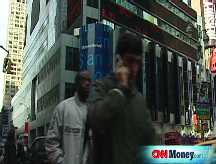Stocks slump after choppy session
Major gauges end a volatile session lower as investors weigh recession fears, debt relief, Verizon results and housing report.

NEW YORK (CNNMoney.com) -- Stocks tumbled Monday, ending a choppy session lower as recession jitters outweighed relief that the government's programs to shore up the financial system have gotten underway.
Investors also weighed a better-than-expected September new home sales report.
The Dow Jones industrial average (INDU) lost 203 points or 2.4% according to early tallies, after having been on both sides of breakeven throughout the session. Verizon rallied 10% after its profit report, but it was one of only 3 Dow components to rise.
The Standard & Poor's 500 (SPX) index fell 3.2% and the Nasdaq composite (COMP) fell 3%. All three major gauges closed at fresh five-year lows.
Tuesday brings the release of the October consumer confidence report.
Stocks had seesawed on both sides of unchanged throughout the session as investors geared up for critical events due later in the week and early next.
As a result, Wall Street is unlikely to move much over the next few sessions, said Harry Clark, CEO of Clark Capital Management Group.
Ahead of the election, the Federal Reserve is expected to announce an interest rate cut at the conclusion of its two-day meeting Wednesday.
"The rate cut this week will help a bit, but we really need to get past the election right now," Clark said.
The start of some of the government's rescue programs this week is significant, Clark said, but it's still going to take several weeks for the impact to be felt and borrowing rates to improve more substantially.
Recession fears decked stocks last week, near the end of a brutal month on Wall Street. The credit crisis, sluggish corporate profit outlook and slump in commodity prices have all exacerbated fears that a recession is imminent, if not already underway.
These underlying issues aren't going to disappear anytime soon, but there are signs that the stock market is closer to hitting bottom, said Ryan Detrick, senior technical strategist at Schaeffer's Investment Research.
Detrick said that stocks are the most "oversold" they've been since the period surrounding Black Monday in October 1987. That means that on a technical basis, it wouldn't be hard to spark a big bounce. Additionally, the level of money sitting in mutual funds and the level of investor fear are good contrarian indicators. Plus, November, December and January are typically good months seasonally on Wall Street.
However, there's nothing typical about this year or this time period on Wall Street, he said, and the usual factors may not carry much weight.
"You have the uncertainty of worldwide recession and the credit markets are still a problem," Detrick said. "For the market to see a significant bounce, we'd need to see signs that our economy and the global economy are turning around."
He said that the recent housing market reports have been positive, but that doesn't change the broader economic outlook.
Brutal month: With just one week left in October, the Dow is down 24.7%, the S&P 500 is down 27.2% and the Nasdaq is down 27.7%.
The Dow is currently on track to post its worst month ever on a point basis and fifth worst ever on a percentage basis, according to Stock Trader's Almanac info going back to 1901.
The S&P 500 is currently on track to post its worst month ever on a point basis and third worst ever on a percentage basis, going back to 1930.
The Nasdaq is on track to post its fourth-worst month ever on a point basis and its second-worst month ever on a percentage basis, going back to its inception in 1971.
Global market effect: World markets continued to retreat as the new week began.
European markets ended lower, with the London FTSE closing down 1%, erasing bigger session losses. Asian markets tumbled overnight, with the Japanese Nikkei falling 6.6% to a 26-year low on worries that the strong yen will hurt exports. The Hong Kong Hang Seng fell 12.7% to a more than four-year low.
The declines followed a Sunday statement from the G7 warning about the excessive volatility of the yen, which hit a 13-year high versus the dollar Friday. Analysts said the statement could mean the government is set to intervene in the currency markets.
The dollar continued to retreat versus the yen on Monday and gained against the euro. Bets that the Bank of England and European Central Bank will have to cut rates aggressively over the next few months have weighed on the euro and pound lately.
Banks and credit: Nine big banks are set to get $125 billion from the Treasury Department this week as part of the $700 billion bank rescue plan passed last month.
Ten regional banks said Monday that they will get at least $18 billion under the bailout plan.
Also beginning this week: The Fed's previously announced program to buy up commercial paper, short-term debt that businesses depend on to fund daily operations.
Despite the government's efforts, lending has remained constrained, with short-term borrowing rates the one exception.
Libor, the overnight bank-to-bank lending rate, edged lower to 1.26% from 1.28% Friday, according to Bloomberg.com. It was a modest retreat after two days of gains. On the upside, that still kept Libor below the Fed's benchmark lending rate of 1.5%, seen as a good sign. Libor hit a record 6.88% earlier this month at the height of the market panic.
The 3-month Libor rate, what banks charge each other to borrow for three months, inched lower to 3.51% from 3.52% Friday.
The TED spread, the difference between what banks pay to borrow from each other for three months and what the Treasury pays, narrowed to 2.67% from 2.70% Friday. The spread hit a record 4.65% earlier this month. The narrower the spread, the more willing banks are to lend to each other.
Treasury prices were little changed, with the yield on the 10-year note at 3.68%, roughly where it stood late Friday. Treasury prices and yields move in opposite directions.
The yield on the 3-month Treasury bill, seen as the safest place to put money in the short term, slipped to 0.75% from 0.86% late Friday, showing investors would rather see little return on their money than risk the stock market.
Last month, the 3-month yield reached a 68-year low around 0%, as investor panic hit its peak.
Results: Dow component Verizon Communications reported higher quarterly earnings that met estimates on higher sales that beat forecasts. Verizon (VZ, Fortune 500) shares jumped over 10%.
With 45% of the third-quarter reports out already, profits are currently on track to have fallen 11.3% from a year earlier, according to the latest estimates from Thomson Reuters.
Oil, gas and gold: U.S. light crude oil for December delivery fell 93 cents to settle at $63.22 a barrel, after falling to a 17-month low in morning trading.
Prices have been sliding since crude peaked at a record $147.27 a barrel on July 11, with speculators pulling out of the market on bets that global demand is slowing. Investors have also had to raise money fast amid the stock market slump and have done so by dumping their oil positions.
Gasoline prices fell another 3.1 cents overnight, to a national average of $2.668 a gallon, according to a survey of credit-card activity by motorist group AAA. It was the 40th consecutive day that prices have decreased. During that time, prices have fallen by $1.18 a gallon, or more than 30%.
COMEX gold for December delivery rose $12.60 to settle at $742.90 an ounce. ![]()





